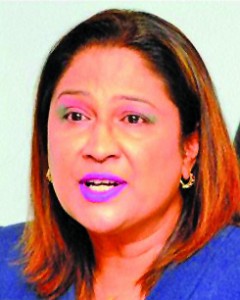
TT Prime Minister
Kamla Persad-Bissessar
Caricom on Tuesday said it would defer consideration of the application by The Dominican Republic to join the regional integration grouping, as the fallout continues from the Constitutional Court ruling in the Spanish-speaking country that could render stateless, thousands of people of Haitian descent living there.
Leaders of the three-member Caricom Bureau, comprising host country Trinidad and Tobago, St Vincent and the Grenadines, and Haiti, met in Port of Spain on Tuesday and said the 15-member regional grouping would also seek to raise the court ruling with several bodies, including, CARIFORUM, the Association of Caribbean states (OAS), the Community of Latin America and Caribbean States (CELAC), as well as maintain “our interest”.
“We look forward to the outcome of the visit to The Dominican Republic of the Inter- American Commission on Human Rights (IACHR), which will travel to that country in early December,” Caricom Chairman and TT Prime Minister Kamla Persad-Bissessar told a news conference.
Repugnant
Persad-Bissessar said the decision on deferral was taken in light of the values and principles which have underpinned the Revised Treaty of Chaguaramas that governs Caricom.
A subsequent statement by Caricom condemned “the abhorrent and discriminatory ruling of September 23, 2013, of the Constitutional Court of The Dominican Republic on nationality which retroactively strips tens of thousands of Dominicans, mostly of Haitian descent, of citizenship rendering them stateless and with no recourse to appeal.”
Caricom said it is especially repugnant that the ruling ignores the 2005 judgement made by the Inter-American Court on Human Rights (IACHR) that The Dominican Republic adapt its immigration laws and practices in accordance with the provisions of the American Convention on Human Rights.
“The ruling also violates The Dominican Republic’s international human rights obligations. Furthermore, the ruling has created an environment where, with the abrogation of rights that flow from citizenship, arbitrariness can flourish as illustrated by recent media reports of the forced deportation to Haiti of persons claiming to be Dominican and with no linguistic or familial ties to that country,” the regional grouping said.
Redress
“The Caribbean Community reiterates its call to the government of The Dominican Republic to take the necessary political, legislative, judicial and administrative steps urgently to redress the grave humanitarian situation created by the ruling.
“The community also calls on regional and hemispheric countries and organisations to lend their voice to urge The Dominican Republic to right this terrible wrong. The community welcomes the intervention by Venezuela to assist in resolving the issue, but given the grave humanitarian implications of the court ruling, the community cannot allow its relationship with The Dominican Republic to continue as normal… It cannot be business as usual.”
According to Caricom, it supports the visit of the Inter-American Commission on Human Rights and will request an advisory opinion from the Inter-American Court of Human Rights. The community will also consider the introduction of a resolution at the United Nations General Assembly condemning the ruling.
Moreover, “we call on the global and regional community to pressure the government of The Dominican Republic to adopt urgent measures to ensure that the jaundiced decision of the Constitutional Court does not stand and that the full citizenship rights of persons of Haitian descent born in The Dominican Republic are guaranteed. The Caribbean Community accords this matter the highest priority.”
Caricom said it was prepared to engage The Dominican Republic but the government of The Dominican Republic must show good faith by immediately taking credible steps as part of an overall plan to resolve the nationality and attendant issues in the shortest possible time.
The Constitutional Court in Santo Domingo has ruled in favour of stripping citizenship from children of Haitian migrants. The decision applies to those born after 1929 – a category that overwhelmingly includes descendants of Haitians brought in to work on farms. But in defending the ruling, Dominican Republic officials said it ends uncertainty for children of Haitian immigrants, allowing them to apply for residency and eventually for citizenship.
The Geneva-based office of the United Nations High Commissioner for Human Rights has called on authorities in Santo Domingo to ensure that the ruling did not leave persons of Haitian descent in “constitutional limbo”. A UN-supported study, released this year, estimated that there were around 210,000 Dominican-born people of Haitian descent and another 34,000 born to parents of other nationalities.



